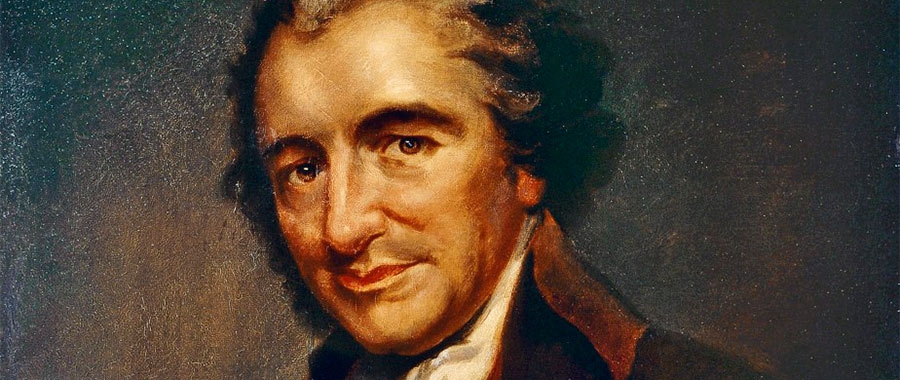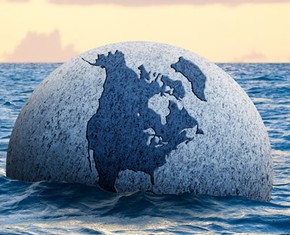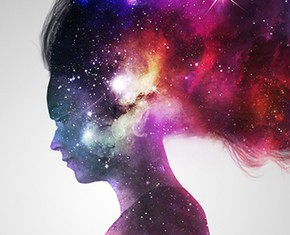The views expressed in our content reflect individual perspectives and do not represent the authoritative views of the Baha'i Faith.
We humans harbor wonderful ideals—kindness, peace, equality, justice, to name just a few—but we have a hard time actually implementing them.
The divide between the willingness to develop ways to solve the most immediate problems of humanity and the unwillingness to entertain and implement such ideals roots itself in two very different views about human reality.
At the beginning of the modern era, which must be measured from the later days of the Enlightenment about two hundred years ago, various new ideas came to the fore. These new concepts presented formidable challenges to the prevailing orders and long-held cultural practices.

Thomas Paine
For instance: Thomas Paine took on superstition in religion. Paine tore the veil off of the motives behind certain religious interpretations that utilized fear to feed dependency on religious leadership. His was a critique on the use of ignorance (lack of reason) and fear to maintain and cultivate a base. Paine’s best point was that through reason—implying education—one could and should form one’s own authentic relationship with the Creator and with spiritual principles in order to form one’s morality.
A few years later, Darwin’s discoveries established aspects of evolutionary progression that made questionable the literal interpretations of Biblical narratives concerning life-terms on the planet. These things caused a break with certain religious interpretations and thus with followings. Herbert Spencer took one of Darwin’s biological findings and co-opted the term “survival of the fittest,” applying it to human society and underwriting the concept (which Darwin himself strongly disagreed with) that we should model our market affairs based on this notion of animal behavior. Many other shifts away from tradition, religion and ancient philosophy took place in the revolutionary years of the 1700-1800s.
These cultural breaks served, among other things, to encourage people to think more for themselves and to live as much through reason as through belief systems. Science took off and industry flourished. The Earth—once separate continents, nations, races and tribes with little knowledge of one another—quickly shrunk to a neighborhood due to the technologies developed by the wave of science.
All this has led to an era of great material progress—but also with incredibly dangerous potentials unprecedented in the history of humankind:
… until material achievements, physical accomplishments and human virtues are reinforced by spiritual perfections, luminous qualities and characteristics of mercy, no fruit or result shall issue therefrom, nor will the happiness of the world of humanity, which is the ultimate aim, be attained. For although, on the one hand, material achievements and the development of the physical world produce prosperity, which exquisitely manifests its intended aims, on the other hand dangers, severe calamities and violent afflictions are imminent. – Abdu’l-Baha, Selections from the Writings of Abdu’l-Baha, pp. 283-284.
The problematic aspect of the newly found “freedom” from the dominance of older religious scripture involved the setting aside of the moral paradigm, the most essential, impactful and protective aspect of the teachings of religion. A woman named Mary Shelley wrote a cautionary tale called Frankenstein in 1818, to warn how the new technology without ethics to guide and control it could get out of hand. Two hundred years later, our excessively militarized and industrially polluted world shows just how right she was to try and warn us.
With so many successive generations of religious worship, some morals had become so deeply ingrained that many people, even while living in the new world of reason, retained some of the core ethics and behaviors of past religious teachings. Even as they distanced themselves from religion, either by modifying religious practice or diminishing the role religion played in their lives, they continued to abide by its moral principles. This impelled the birth of humanism, a version of modernism, a blend of reason with basic morality.
Eventually, though, new materialist philosophers proclaimed there was no God at all, nor were the related moral codes obligatory. Man was free to fully assert his desire. Of course in this philosophy no afterlife existed either, nowhere one would be called to account for one’s actions—which made this world and life the nexus of all consequence. In a sense, this pattern resembles the shift to quarterly accounting, in which nothing matters but how a business is doing at the present moment. Laissez-faire capitalism helped provide the marketplace aspect of this behavior, which began to reflect itself in morality.
As ethics were increasingly put aside, in their stead the self and its sensual double, the body, became the only answerable party. Immediate pleasure and one’s own well-being became the new standard. To generalize all this demographically, now three basic types of agents operate in the world today:
- those who still follow the authority of others, either religious, traditional, political or now celebrities.
- those who function with independent reasoning, yet have some allegiance to basic morals sourced from their traditions or habits, which invariably stem from older religious ideals. This largest moderate middle basically holds the world back from complete anarchy and chaos, even if it does not move forward at any great speed towards more progressive ideals.
- those who, while having freed themselves from traditional religion, chose to utilize reason exclusively to serve their own desires. This group contains perhaps the widest range of people. It includes those who are relatively mild as agents of self-interest, to those who are aggressively out to gain all that they can, by whatever means necessary, no matter who their behavior negatively effects.
This last group maintains the notion that man really is an animal, and uses it as the justification for their behavior. One contemporary refrain from this group holds that life is “all about money and sex”—that we cannot escape or even control these drives, whether we admit it or not.
This viewpoint basically asserts that we are stuck, as animals are, with motivations and behaviors we simply cannot change, thus we have no option to choose to act differently, and thus our selfishness, is not only “natural” but also justifiable. This position believes that the “do-gooder” is simply a hypocrite, that so-called altruistic behavior is really indirection for an intent to satisfy the animal self or the ego, that all action is based entirely on self-interest, which in its leisure state, is the seeking of pleasure, and in its active state, is competitive, with the goal to dominate whatever context one is in and, it accepts the use of violence to achieve one’s goal.
Of course holding this view makes a very bothersome thing go away—it kidnaps any guilt or remorse one might have as to how one’s action effects others by justifying itself with these quasi-paranoiac epithets: “Only the fittest survive.” “If I don’t do it, somebody else will.” “If I don’t do it to them, they will do it to me.” “The means justify the ends.” “Win at all costs.” … and so on.
As we survey this “intelligent animal” viewpoint we can rightfully ask, where does this animal live? The animal lives in the jungle. True to form, from this viewpoint the human world is seen as a jungle. In this conceptual universe, the world represents an entirely competitive, chaotic and combative environment. How ironic that this view deftly imitates the “all against all” world that Thomas Hobbes so brilliantly critiqued in his seminal 1650 work Leviathan, which advocated for civil unity and prompted the first stirrings of modern governance.
Many have said that only a new Faith, a truly modern and progressive religion, can counter these destructive trends.
















Comments
Comments are closed.